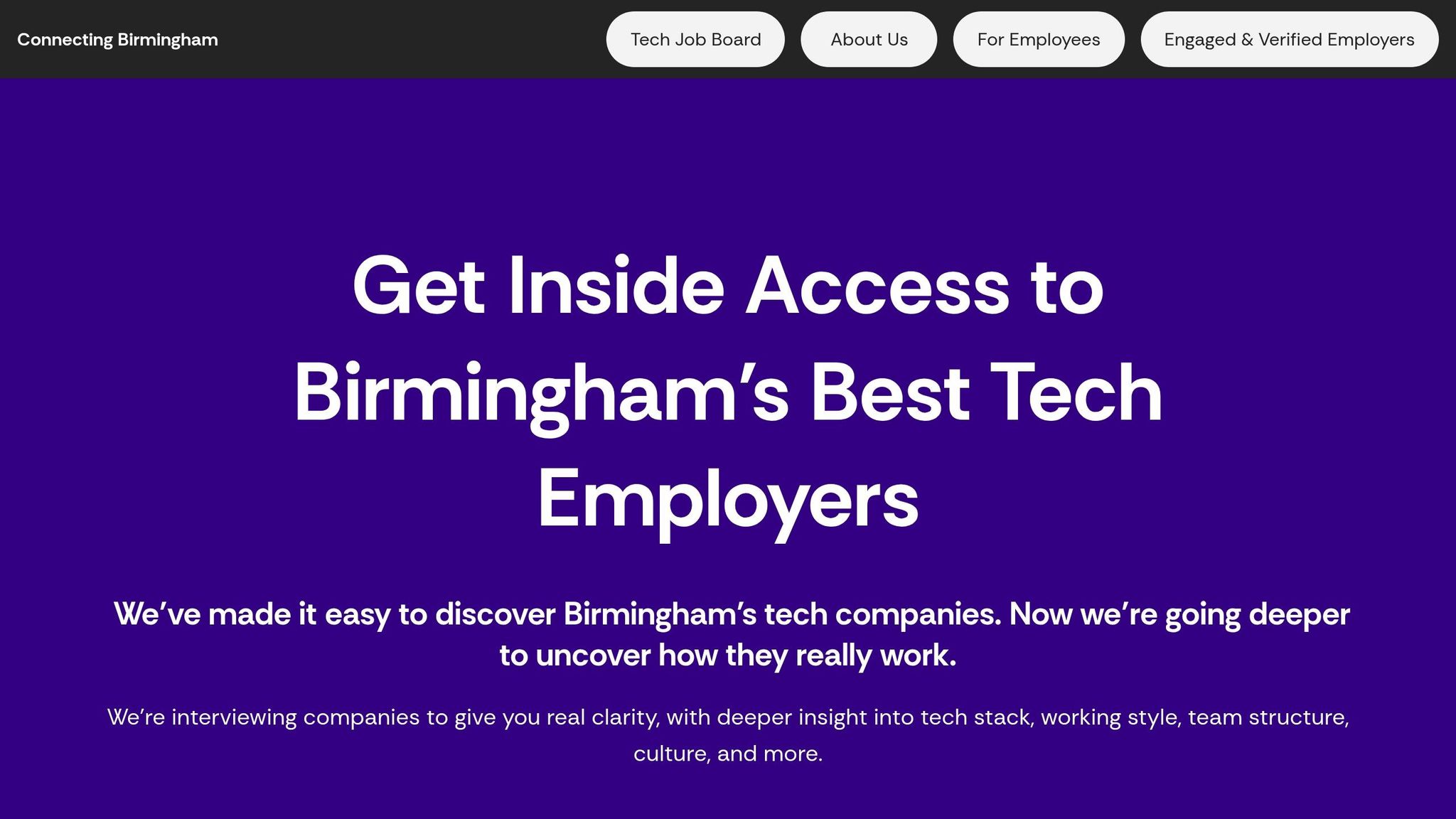Starting a green startup in Birmingham offers opportunities tied to the city's efforts to achieve net-zero emissions by 2030. With support from local authorities, access to skilled professionals, and a strong tech ecosystem, Birmingham is a prime location for eco-focused ventures. Here's a quick guide to get started:
- Define Your Concept: Address local challenges like air pollution or waste management with clear, measurable goals.
- Legal Setup: Register your business with Companies House and comply with environmental regulations like the Green Claims Code.
- Funding: Explore grants and financial support aimed at green businesses. Prepare detailed plans showcasing your impact and growth potential.
- Build Your Team: Use platforms like Connecting Birmingham to find talent aligned with your mission.
- Green Operations: Implement practices like circular economy methods and track your environmental impact.
- Network Locally: Engage with initiatives like the West Midlands Circular Economy Routemap or Tyseley Energy Park for partnerships and resources.
Birmingham’s combination of local support, infrastructure, and a growing green economy makes it an ideal place to launch a business focused on addressing environmental challenges.
How Aron Gelbard Built Bloom & Wild into a £120M Brand
Define Your Business Concept and Green Goals
Root your startup's mission in Birmingham's specific environmental challenges. The city faces pressing issues like air pollution, traffic congestion, and waste management. By aligning your business concept with these local concerns, you ensure your venture not only carries the "eco-friendly" label but also delivers real solutions for the community. This approach lays a solid foundation for navigating regulatory, financial, and operational hurdles.
Choose Your Green Business Focus
Birmingham's environmental struggles present clear opportunities for innovation. For instance, traffic-related air pollution is a serious health concern and a contributor to congestion. Waste management is another critical area that demands sustainable and creative solutions. By focusing on these challenges, your green startup can address tangible needs while positioning itself as a relevant and impactful player in the local market.
Define Specific Green Goals
Set environmental targets that are clear, measurable, and time-sensitive. Avoid vague aspirations and instead establish goals that showcase the direct impact of your solutions. For example, if you're tackling air pollution, outline specific emission reduction targets. If waste management is your focus, aim for quantifiable reductions in waste or increases in recycling rates.
Consider adopting frameworks like the United Nations Sustainable Development Goals to validate your targets and monitor progress. Well-defined objectives not only demonstrate your commitment to making a difference but also attract investors by showcasing measurable impact. Aligning your goals with Birmingham’s environmental priorities further strengthens your startup’s relevance and value.
Handle Legal Requirements and Rules
Setting up your green startup in the UK means navigating the usual business registration steps while also addressing specific environmental regulations. Green businesses face extra scrutiny, especially regarding environmental claims and the need for operational permits.
Register Your Business
To legally establish your green startup, you'll need to register it with Companies House, the UK's official business registrar. The online process costs £12 and gives your business the legal status needed to operate, secure funding, and enter contracts.
Choosing the right business structure is crucial. A limited company offers liability protection and is attractive to investors. If you're working with partners, a limited liability partnership (LLP) might be a better fit. For those looking for simplicity, operating as a sole trader is an option, though it doesn't provide liability protection.
Before registering, check that your chosen business name is available on Companies House and avoid making misleading environmental claims. Names featuring terms like "eco", "green", or "sustainable" could draw regulatory attention if your operations don’t align with these promises.
Prepare the necessary documents, including a Memorandum and Articles of Association, a Statement of Capital (if issuing shares), and identification for directors. Once registered, you'll receive a Certificate of Incorporation, officially recognising your business. After this, ensure your operations comply with all environmental regulations.
Meet Green Compliance Rules
Green businesses must adhere to strict environmental regulations, including the Green Claims Code, which requires accurate and evidence-based environmental claims.
Avoid "greenwashing" - making exaggerated or false claims about your environmental practices. Regulatory bodies like the Competition and Markets Authority (CMA), Trading Standards Services, and the Advertising Standards Authority (ASA) closely monitor green claims. Misleading statements can lead to legal action.
"Non-compliance with consumer protection law may lead the CMA, Trading Standards Services, or sector regulators to take court action."
To strengthen your green credentials, consider recognised certifications such as B Corp, Green Mark, or Fairtrade. Additionally, you’ll need to secure any required environmental permits. Activities that could impact air, water, land, drainage, or flood risk require permits from the Environment Agency or Birmingham City Council. Operating without these permits is illegal and could result in heavy penalties.
If your business operates in Birmingham, be aware of the Clean Air Zone (CAZ). This zone, active 24/7 within the city centre (inside the A4540 Middleway), charges daily fees for vehicles that fail to meet emission standards. If your business involves logistics or deliveries, factor these costs into your budget.
For environmental permits, reach out to Birmingham City Council’s environmental protection team. If you're unsure whether your activities require permits, consult the Environment Agency before starting operations. These legal steps not only ensure your business complies with the law but also demonstrate your commitment to genuine sustainability within Birmingham.
Get Funding and Financial Support
Finding funding for your green startup means tapping into a variety of grants available locally and nationally. Birmingham, with its ongoing support for sustainability projects, is a great place for entrepreneurs focused on eco-friendly ventures.
Find Grant Opportunities
Start by researching grant programmes aimed at supporting sustainable projects. Local councils, regional authorities, and national organisations often provide funding for clean technology and other green initiatives. Pay close attention to the eligibility requirements, deadlines, and application guidelines to ensure your startup aligns with the funding objectives.
Once you've identified suitable grants, focus on preparing strong financial documentation to back your application.
Prepare Your Financial Papers
After pinpointing grant opportunities, it's time to organise your financial documents. These should clearly demonstrate your startup's potential for success and its environmental impact. Begin with a detailed business plan that outlines your green vision, sustainability goals, and the market opportunities in the eco-sector.
Create three-year financial projections that include costs related to green technology, potential energy savings, and estimated carbon reductions. Including return-on-investment calculations - covering both financial and environmental benefits - can make your case even stronger.
To validate your green impact, define measurable metrics. Examples include carbon emissions reduced, waste diverted, or renewable energy generated. Make sure these metrics align with the goals outlined in your business plan.
Prepare cash flow forecasts that account for seasonal changes in renewable energy production and any compliance-related costs. Conduct a competitive analysis to position your startup within the broader sustainability market, highlighting what makes your approach stand out.
Include a risk assessment covering potential business and environmental challenges. Develop a project plan with clear milestones, deliverables, and success metrics to show how you’ll achieve your environmental objectives within the funding period.
Lastly, document any partnerships or endorsements from environmental organisations or local councils. These can add credibility to your application by showcasing external confidence in your green credentials.
sbb-itb-1ad140f
Build Your Team and Green Company Culture
To succeed in creating a sustainable business, you need a team that shares your commitment to the environment. Birmingham's thriving tech scene offers a wealth of professionals who are passionate about environmental innovation. With your legal framework in place and funding secured, it’s time to assemble a team that will propel your green mission forward.
Use Connecting Birmingham for Hiring

Birmingham’s tech employment has seen an impressive 400% growth, with 70% of roles filled through networking - a testament to the city’s rich talent pool. Platforms like Connecting Birmingham can help you tap into this resource through verified profiles and targeted job listings tailored to the region’s tech sector.
This platform offers verified company profiles and job listings, ensuring you connect with legitimate candidates who are familiar with Birmingham’s market and invested in its growth. The verification process saves time and ensures quality, making it easier to find professionals aligned with your goals.
Connecting Birmingham’s dedicated Jobs section is perfect for advertising sustainability-focused roles. With Birmingham recognised as the UK’s fastest-growing tech hub in 2021 and 2022, you’ll have access to a dynamic pool of candidates. The city’s tech economy is projected to add £2.7 billion in value by 2025, creating 52,000 new tech roles - a clear indication of the talent available.
When listing job openings, make your environmental goals clear. Highlight how each role contributes to Birmingham’s vision of becoming carbon-neutral by 2030, a mission that’s driving innovation in renewable energy and efficiency technology.
Build a Green-Focused Team
Once you’ve attracted candidates, the next step is to assess how well they align with your sustainability goals. Look for individuals with practical experience in green initiatives, even if their background is in a different industry. For example, someone who has worked on energy efficiency projects in manufacturing could bring valuable perspectives to a clean tech startup.
During interviews, ask candidates how their previous experience connects to your environmental mission. This not only helps you identify the right fit but also ensures that your team members are naturally aligned with your company’s green culture.
It’s important to balance technical skills with a sustainability mindset. A software developer with experience in eco-conscious projects could be more valuable than someone with slightly stronger technical skills but no interest in environmental issues.
Write clear, detailed job descriptions that emphasise your environmental mission. For example, explain how a marketing manager could help communicate your company’s environmental impact or how a product developer would incorporate eco-friendly design principles. This clarity ensures candidates understand how their role contributes to the bigger picture.
Your team will play a key role in achieving the measurable green targets outlined in your business plan. From day one, establish green practices like remote working, using renewable energy, and vetting suppliers for eco-credentials. When your team sees these values reflected in daily operations, they’ll know sustainability is more than just a marketing slogan - it’s the core of your business.
Offer ongoing education on sustainability trends and industry practices to keep your team informed and engaged. This not only enhances their knowledge but also reinforces the importance of environmental considerations in their work.
To attract environmentally conscious candidates, consider offering green benefits such as cycle-to-work schemes or EV charging facilities. These perks show your commitment to sustainability and help you build a team that’s as passionate about the environment as you are. By embedding green values into every aspect of your operations, you contribute to Birmingham’s vision of a greener future.
Set Up Green Business Operations
Incorporating sustainability into every aspect of your business can help reduce costs, attract eco-conscious customers, and position your venture as a leader in Birmingham's growing green economy. The strategies below build on the foundation of earlier steps and bring your green vision to life.
Use Circular Economy Methods
The circular economy revolves around minimising waste and keeping resources in use for as long as possible. For startups in Birmingham, this means rethinking conventional business practices and finding smart ways to transform waste into usable resources.
Start small - reduce waste by opting for refurbished furniture and building partnerships with local businesses to share resources. Birmingham has a range of office furniture specialists offering refurbished items that are budget-friendly and environmentally friendly.
Sharing resources is another practical step. For example, consider jointly using a 3D printer with nearby businesses. This not only cuts costs but also fosters local collaboration.
When purchasing materials or services, prioritise suppliers with strong environmental credentials, such as those with ISO 14001 or B Corp certifications. Evaluate the entire lifecycle impact of what you’re buying, not just the upfront costs.
You might also explore a product-as-a-service model. This approach allows for ongoing maintenance, upgrades, and recycling, ensuring a more sustainable lifecycle for your products while maintaining close customer relationships.
Going digital is another effective way to align with green goals. Use cloud services, electronic records, and video conferencing to reduce reliance on physical infrastructure, cut travel, and lower overall costs. By integrating circular practices into your business, you can make a measurable impact while staying true to your green objectives.
Track and Report Your Green Impact
Once sustainable operations are in place, measuring and sharing your progress becomes key to refining your eco-friendly approach and building trust with stakeholders. Start by setting baseline metrics to showcase your commitment to both investors and customers.
Define key performance indicators (KPIs) such as energy consumption, waste reduction, renewable energy usage, and emissions from business travel. Initially, simple tracking tools like spreadsheets will suffice, but as your business grows, you may want to invest in specialised environmental management software.
Regular environmental audits can uncover inefficiencies. For example, review energy bills, assess waste streams, and check supplier performance against environmental benchmarks. These audits can highlight areas for improvement before they become costly problems.
To track your carbon footprint, use tools like the Greenhouse Gas Protocol or online calculators. As your operations expand, more advanced systems can provide deeper insights.
Transparent reporting is critical for building credibility. Quarterly sustainability reports can outline your progress, address challenges, and highlight improvements. Sharing these reports on your website or with potential investors can help your startup stand out.
Consider pursuing certifications like B Corp status or ISO 14001 accreditation. While these require time and effort, they validate your sustainability efforts and may open doors to funding and partnerships.
As your business grows, real-time monitoring tools - such as smart metres for energy use or waste tracking systems - can help you quickly identify and resolve inefficiencies. Documenting cost savings from reduced energy use and waste disposal can also strengthen your case when seeking funding.
Finally, regular reporting ensures alignment with Birmingham’s environmental goals and can provide access to local support programmes, reinforcing your role in the city’s sustainable economy.
Network and Partner in Birmingham
Build local connections to drive growth and contribute to Birmingham's green goals. The city offers a range of opportunities for eco-conscious businesses to collaborate and thrive.
Join Local Green Projects
The West Midlands Combined Authority (WMCA) has launched several initiatives aimed at engaging green startups in larger sustainability efforts. One standout project is the West Midlands Circular Economy Routemap, developed in 2021 with Useful Projects. This roadmap focuses on three core areas: Circular Manufacturing, Circular Construction, and Circular Food.
Since its introduction, the WMCA has rolled out impactful projects like an industrial symbiosis pilot and the West Midlands Resource Reuse Network. These initiatives encourage businesses to share resources, reducing waste and promoting efficient practices.
If you're looking to get involved, reach out to the WMCA at environment@wmca.org.uk. They welcome fresh ideas and partnerships from local businesses. Another option is to join the Resource Reuse Network, which helps startups access materials they need while supporting other businesses in managing their waste responsibly.
For startups focused on clean energy and technology, Tyseley Energy Park (TEP) is a key resource. TEP not only generates clean energy and transport fuels but also hosts an Energy Incubation Hub. Startups here gain access to research facilities, testing labs, and the University of Birmingham's Energy Innovation Centre.
TEP’s incubation programme offers more than just workspace - it connects startups with industry experts, researchers, and potential customers in the clean energy sector. This collaborative environment accelerates development and fosters innovation. Use these connections to strengthen ties with local councils and businesses, opening doors to further opportunities.
Work with Local Businesses and Councils
Beyond participating in green projects, building direct partnerships with local businesses and councils can significantly expand your startup's reach. The WMCA works with regional partners to encourage circular economy practices, including collaborations with the Innovation Alliance for the West Midlands on the Repurposing to Zero Framework.
Local councils are actively seeking innovative solutions for challenges like waste management and energy efficiency. By establishing relationships with council procurement teams early, you can position your startup to win tenders for green services and technologies.
Joining Birmingham's green-sector networks is another way to grow. These groups regularly meet to share insights, tackle joint projects, and foster collaboration. Established businesses within these networks often seek inventive partners to help meet their sustainability goals, creating revenue opportunities for startups like yours.
Cross-sector partnerships can be especially beneficial. For instance, a green technology company might collaborate with a manufacturer to cut emissions, while a sustainable food startup could work with local restaurants to develop circular supply chains. These collaborations not only provide steady income but also allow you to refine your offerings based on practical feedback. They also demonstrate your commitment to Birmingham's eco-friendly future.
The WMCA’s industrial symbiosis initiatives create structured opportunities for partnerships. By connecting businesses so that one company’s waste becomes another’s resource, these programmes reduce costs and environmental impact for everyone involved.
Finally, document your successful partnerships and their outcomes. These case studies can be powerful tools for attracting new collaborators or securing funding. Regional development agencies often take notice of local success stories, potentially leading to further support and growth opportunities.
Key Points for Launching Your Green Startup
Starting a green business in Birmingham requires careful planning and attention to several critical areas to ensure both long-term success and environmental impact. With the regulatory landscape shifting rapidly, especially as 2025 approaches, it's essential to prepare for stricter ESG standards and carbon reduction targets.
Set clear, measurable sustainability goals - whether in areas like circular manufacturing, clean energy, or sustainable food systems. Your business idea should tackle genuine environmental challenges while also being financially sustainable. Aligning your goals with Birmingham's growing green economy will position your startup for success.
Stay ahead of legal requirements by understanding the new regulations that will soon come into effect. For instance, starting 15 June 2025, new commercial buildings must reduce carbon emissions by 27% compared to current standards. Additionally, the updated Construction Products Regulation, effective January 2025, introduces Digital Product Passports, requiring manufacturers to disclose climate-related factors. Familiarising yourself with these rules early allows you to integrate compliance into your business model, avoiding costly retrofits down the line. This proactive approach also strengthens your case when seeking funding and ensures smoother operations.
When it comes to securing funding, having detailed financial documentation that highlights both your environmental impact and commercial potential is key. The UK government offers grants and tax incentives for businesses transitioning to green practices. However, competition is intense, so your application must clearly showcase your sustainability efforts and growth prospects.
Building the right team is another cornerstone of a successful green startup. Use resources like Connecting Birmingham to recruit individuals who share your commitment to sustainability. Beyond hiring, fostering a company culture rooted in environmental principles is crucial. Operational excellence should also be prioritised from the outset.
Implement strong practices to track and report your environmental impact using established frameworks. Over the past decade, ESG regulations have surged by 155%, and starting April 2025, the Competition and Markets Authority will impose hefty penalties - up to 10% of global turnover or £300,000, whichever is higher - for greenwashing violations. Accurate reporting not only protects you from these fines but also enhances your credibility with investors and customers.
Finally, take advantage of Birmingham's vibrant green ecosystem. Engage with local environmental initiatives and community projects to build partnerships, attract customers, and uncover new funding opportunities. This active participation can be a game-changer for your startup's growth and visibility.
FAQs
What are the main environmental challenges in Birmingham that green startups can help tackle?
Birmingham is grappling with several pressing issues that green startups are well-positioned to tackle. Air pollution remains a major problem, primarily due to road traffic and diesel vehicles, which have a serious impact on public health. The city also faces increasing challenges from flood risks and the urban heat island effect, both of which are exacerbated by limited green spaces and the broader consequences of climate change.
On top of that, Birmingham has pockets of derelict brownfield land and signs of urban decline, which offer potential for eco-friendly redevelopment. By addressing air quality, bolstering flood defences, and revitalising neglected areas, green startups have a chance to make a meaningful difference in shaping a more sustainable Birmingham.
What steps can a green startup in Birmingham take to comply with environmental laws and avoid misleading sustainability claims?
To operate within the law, a green startup in Birmingham needs to stay informed about essential UK regulations like the Environmental Act, alongside any specific local rules. Familiarity with these legal frameworks ensures your business remains compliant while supporting sustainability and climate initiatives.
Avoiding greenwashing is equally important. Be transparent by backing up all environmental claims with solid evidence and clear communication. Regular audits of your sustainability efforts can help you stay on track and steer clear of overstatements. Following advice from regulatory authorities and committing to honest reporting will not only keep you compliant but also strengthen trust and credibility with your audience.
What funding options are available for green startups in Birmingham, and how can they increase their chances of success?
Green startups in Birmingham have access to a variety of funding opportunities, including grants aimed at renewable energy projects and regional programmes designed to support sustainability-focused businesses. These grants can range from modest amounts of around £2,500 to more substantial funding of up to £100,000, depending on the project's scope and the eligibility requirements.
To secure funding, startups should prioritise crafting well-organised proposals that clearly highlight their environmental benefits and demonstrate strong financial potential for the long term. Establishing local connections can be invaluable - engaging with local councils, joining business networks, and keeping an eye on funding announcements can open doors. Additionally, platforms like Connecting Birmingham can help startups find trusted partnerships, giving them an extra edge in achieving their goals.


